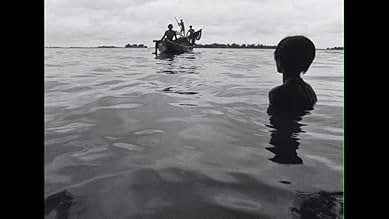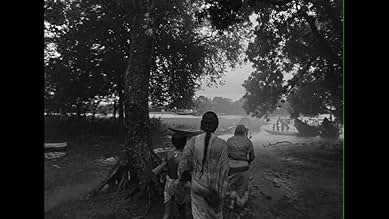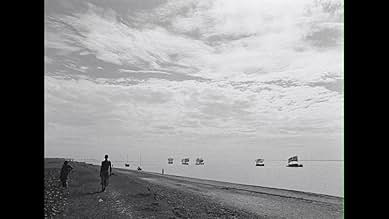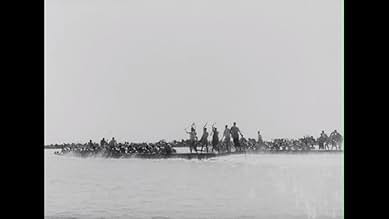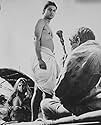Ajouter une intrigue dans votre langueAfter their wedding night, a fisherman's young wife is kidnapped on the Titas River in Brahmanbaria, Bangladesh.After their wedding night, a fisherman's young wife is kidnapped on the Titas River in Brahmanbaria, Bangladesh.After their wedding night, a fisherman's young wife is kidnapped on the Titas River in Brahmanbaria, Bangladesh.
- Director
- Writers
- Stars
Avis en vedette
This film is an adaptation of Adwita Malla Burman's Bengali literary classic under the same title. It is tale of those marginal people belonging to a poorer fishing community who live from hand to mouth. Exploring different sectors of life is one of the most amazing aspects of both the film and the novel.
The film sequences are maintained in parallel to the novel. The film has brilliant editing and that makes it very dynamic and fluent. Fade-ins and fade-outs for transition are used in many cases. The film seems to be gradually acquiring technical sophistry. Fixed frame is used in many cases and the camera movement is kept at a minimal level at the beginning of the film. Panning, tilt-ups and tilt-downs are countable. But this 'apparently' mediocre camera usage could not amputate Ghatak's craftsmanship. Some continuity cuts during the long duration shot of 'Dourer Naw' (Boat for Running Races) certainly deserve positive appraisal. The film has some stunning close ups. They really deserve applause. The close ups are symbolic and very well-articulated.
Negative aspects are minimum but they cannot be overlooked as they have an effect on the film. Sometimes the characters deliver speeches in a word or two in urban Bengali which betray the realism their acting. The film has got only two framing errors. It is the disadvantage of using fixed frame. Moreover the spectators are captured who came to watch the shooting for once (while Basanti was engaged in a fight with her mother) in the film. In another case, probably the prompter is captured or the person may be another spectator while Kader Mian was arguing with his daughter-in-law. The sequences sometimes seem to be incredulously positioned. Moreover, they seem to be hastily pushed towards their respective ends. But Ritwik's crave for stark realism is praiseworthy. Other than these, this film is technically perfect.
The film is a must watch for having a better exposure of the lives of marginal people of a third world country. Technical excellence is another reason to watch this film.
You'd think that after a lifetime of reading fantasy and studying the anthropology of magic, this would be catnip to me. However, fantasy as it is written tends to have an almost engineering quality to its construction, with things like quests that must be undertaken, or great monsters that must be fought, or princesses that must be rescued. The patterns are too familiar. Likewise, the magic in these things is constructed like machinery. Occasionally you run across things based on Greek mythology, where the gods are squabbling people taking one side or the other, and throwing thunderbolts or sending earthquakes.
But to look at this movie is to see a society that is barely above animism, the belief that everything has a soul, whether it is a human or a cat, or a tree, or a rock. And the only way someone like me can handle a worldview like that is in a mechanical fashion. There is no mystery, just ignorance, and a rock falls from your hand to the ground when you release it regardless. But the characters in this movie believe in the mystery. The river Titas may just go away, or Miss Samad may just be fooling herself. No one knows anything, and no one can know anything. It's not a worldview I can believe, and so I am reduced to seeing if the movie is internally consistent.... but that won't work either, because if it's not, then that is also a mystery, an insoluble one that is a fact of existence.
It makes my head spin. Ritwik Ghatak's movie tells a tale of a small fishing village where reality and legend are the same thing. Is it a good telling? My Western mind can't really tell.
The film starts by announcing that not many people know about and much less care about the people living in this region which is one of the world's poorest places. And by the end of it most things look very unfortunate for them still. It is realistically made, shot on location so that doesn't feel contrived. That being said, some of the acting looks funny and artificial by our standards. As we move focal points also it can be a little difficult to follow the numerous plots.
Antropologically interesting too.
Le saviez-vous
- AnecdotesDirector Ghatak appears in the film as a boatman, and Basanti's story is the first of several melodramatic tales.
- Citations
Ramprasad: That's the way it happens. It all comes and then disappears again. There's a spark of life. And suddenly it's not there. It all becomes untraceable. You were a child yesterday. Today, you're a woman. This ever-flowing river Titas may become bone dry tomorrow. It may not even have the last drop without which our soul cannot depart. Yet these flocks of sails move on and on and on...
Meilleurs choix
Détails
- Date de sortie
- Pays d’origine
- Site officiel
- Langue
- Aussi connu sous le nom de
- A River Called Titas
- société de production
- Consultez plus de crédits d'entreprise sur IMDbPro
- Durée
- 2h 39m(159 min)
- Couleur
- Mixage
- Rapport de forme
- 1.37 : 1

